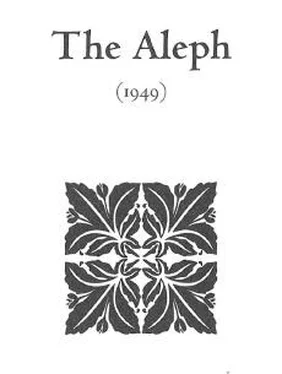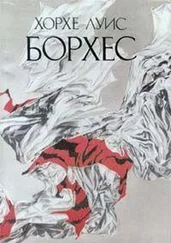Хорхе Борхес - Collected Fictions
Здесь есть возможность читать онлайн «Хорхе Борхес - Collected Fictions» весь текст электронной книги совершенно бесплатно (целиком полную версию без сокращений). В некоторых случаях можно слушать аудио, скачать через торрент в формате fb2 и присутствует краткое содержание. Год выпуска: 1999, ISBN: 1999, Издательство: Penguin (UK), Жанр: Старинная литература, на английском языке. Описание произведения, (предисловие) а так же отзывы посетителей доступны на портале библиотеки ЛибКат.
- Название:Collected Fictions
- Автор:
- Издательство:Penguin (UK)
- Жанр:
- Год:1999
- ISBN:9780140286809
- Рейтинг книги:5 / 5. Голосов: 1
-
Избранное:Добавить в избранное
- Отзывы:
-
Ваша оценка:
- 100
- 1
- 2
- 3
- 4
- 5
Collected Fictions: краткое содержание, описание и аннотация
Предлагаем к чтению аннотацию, описание, краткое содержание или предисловие (зависит от того, что написал сам автор книги «Collected Fictions»). Если вы не нашли необходимую информацию о книге — напишите в комментариях, мы постараемся отыскать её.
Collected Fictions — читать онлайн бесплатно полную книгу (весь текст) целиком
Ниже представлен текст книги, разбитый по страницам. Система сохранения места последней прочитанной страницы, позволяет с удобством читать онлайн бесплатно книгу «Collected Fictions», без необходимости каждый раз заново искать на чём Вы остановились. Поставьте закладку, и сможете в любой момент перейти на страницу, на которой закончили чтение.
Интервал:
Закладка:
"I mounted as fine a horse as ever I straddled, and directed my course for Natchez."*
THE INTERRUPTION
Morell leading uprisings of Negroes that dreamed of hanging him ... Morell hanged by armies of Negroes that he had dreamed of leading ... it pains me to admit that the history of the Mississippi did not seize upon those rich opportunities. Nor, contrary to all poetic justice (and poetic symmetry), did the river of his crimes become his tomb. On the 2nd of January, 1835, Lazarus Morell died of pulmonary congestion in the hospital at Natchez, where he'd been admitted under the name Silas Buckley. Another man in the ward recognized him. On that day, and on the 4th of January, slaves on scattered plantations attempted to revolt, but they were put down with no great loss of blood.
The Improbable Impostor Tom Castro
I give him that name because it was by that name he was known (in 1850 or thereabouts) on the streets and in the houses of Talcahuano, Santiago de Chile, and Valparaiso, and it seems only fair that he take it again, now that he has returned to those lands—even if only as a ghost, or a Saturday-night amusement.[¹] The birth register in Wapping calls him Arthur Orton, and gives the date of his birth as June 7, 1834. We know that he was the son of a butcher, that his childhood was spent in the gray meanness of the London slums, and that he harkened to the call of the sea. That story is not an uncommon one; "running away to sea" was the traditional English way to break with parental authority—the heroic ritual of initiation. Geography recommended such a course, as did the Scriptures themselves: "They that go down to the sea in ships, that do business in great waters; these see the works of the Lord, and his wonders in the deep" (Psalms 107:23-24). Orton fled his deplorable, dingy-pink-colored suburb and went down to the sea in a ship; with ingrained disappointment he regarded the Southern Cross, and he jumped ship at Valparaiso. He was a gentle idiot. Though by all logic he could (and should) have starved to death, his muddle-headed joviality, his permanent grin, and his infinite docility earned him the favor of a certain family named Castro, whose patronym he took ever after as his own. No traces of his stay in South America remain, but we know that his gratitude never flagged: in 1861 he turned up in Australia, still bearing the name Tom Castro.
In Sydney he made the acquaintance of a man named Ebenezer Bogle, a Negro servant. Bogle, though not handsome, had that reposeful and monumental air, that look of well-engineered solidity, often possessed by a black man of a certain age, a certain corporeal substance, a certain authority. Bogle had another quality, as well—though some textbooks in anthropology deny the attribute to his race: he was possessed of genius. (We shall see the proof of that soon enough.) He was a temperate, decent man, the ancient African appetites in him corrected by the customs and excesses of Calvinism. Aside from the visitations from his god (which we shall describe below), he was normal in every way; his only eccentricity was a deep-seated and shamefaced fear that made him hesitate at street corners and at crossings, survey east, west, north, and south, and try to outguess the violent vehicle that he was certain would end his days.
Orton came upon his future friend one afternoon as Bogle was standing on a run-down corner in Sydney trying to screw up the courage to face his imagined death. After watching him for several minutes, Orton offered him his arm, and the two astounded men crossed the inoffensive street. Out of that now-bygone evening a protectorate was forged: the monumental, unsure Negro over the obese Wapping simpleton. In September of 1865, the two men read a heartbreaking piece of news in the local paper.
THE ADORED ONE DECEASED
In the waning days of April, 1854 (as Orton was inspiring the effusions of Chilean hospitality, which was as welcoming as that country's patios), there had sunk in the waters of the Atlantic a steamship christened the Mermaid, bound from Rio de Janeiro to Liverpool. Among the drowned had been one Roger Charles Tichborne, an English military officer brought up in France, and the firstborn son of one of England's leading Catholic families. How-ever improbable it may seem, the death of this Frenchified young man (a young man who had spoken English with the most cultured of Parisian ac-cents and who had inspired the unparalleled envy that can only be aroused by French intelligence, grace, and affectation) was an event of supreme importance in the destiny of Arthur Orton, who had never so much as laid eyes on him. Lady Tichborne, Roger's horrified mother, refused to believe the reports of his death. She published heartrending advertisements in all the major newspapers, and one of those advertisements fell into the soft, funereal hands of Ebenezer Bogle, who conceived a brilliant plan.
THE VIRTUES OF UNLIKENESS
Tichborne had been a slim, genteel young man with a reserved and some-what self-absorbed air. He had sharp features, straight black hair, tawny skin, sparkling eyes, and an irritatingly precise way of speaking. Orton was an irrepressible rustic, a "yokel," with a vast belly, features of infinite vagueness, fair and freckled skin, wavy light-brown hair, sleepy eyes, and no, or irrelevant, conversation. Bogle decided that it was Orion's duty to take the first steamer for Europe and realize Lady Tichborne's hope that her son had not perished—by declaring himself to be that son. The plan had an irrational genius to it. Let me give a simple example: If an impostor had wanted to pass himself off as the emperor of Germany and king of Prussia in 1914, the first thing he'd have done would be fake the upturned mustaches, the lifeless arm, the authoritarian scowl, the gray cape, the illustrious and much-decorated chest, and the high helmet. Bogle was more subtle: he would have brought forth a smooth-faced Kaiser with no military traits, no proud eagles whatsoever, and a left arm in unquestionable health. We have no need of the metaphor; we know for a fact that Bogle produced a fat, flabby Tichborne with the sweet smile of an idiot, light-brown hair, and a thoroughgoing ignorance of French. Bogle knew that a perfect facsimile of the beloved Roger Charles Tichborne was impossible to find; he knew as well that any similarities he might achieve would only underscore certain inevitable differences. He therefore gave up the notion of likeness altogether. He sensed that the vast ineptitude of his pretense would be a convincing proof that this was no fraud, for no fraud would ever have so flagrantly flaunted features that might so easily have convinced. We should also not overlook the all-powerful collaboration of time: the vicissitudes of fortune, and fourteen years of antipodean life, can change a man.
Another essential argument in favor of Bogle's plan: Lady Tichborne's repeated and irrational advertisements showed that she was certain that Roger Charles had not died, and that she would will herself to recognize him when he came.
THE MEETING
Tom Castro, ever accommodating, wrote to Lady Tichborne. In order to prove his identity, he invoked the irrefutable proof of the two moles near his left nipple and that painful and therefore unforgettable episode from his childhood when a swarm of bees had attacked him. The letter was brief and, in the image of Bogle and Tom Castro, free of any scruples as to the way words ought to be spelled. In her majestic solitude in her hôtel particulier in Paris, Lady Tichborne read and reread the letter through happy tears, and in a few days she had recaptured the recollections her son had invoked.
Читать дальшеИнтервал:
Закладка:
Похожие книги на «Collected Fictions»
Представляем Вашему вниманию похожие книги на «Collected Fictions» списком для выбора. Мы отобрали схожую по названию и смыслу литературу в надежде предоставить читателям больше вариантов отыскать новые, интересные, ещё непрочитанные произведения.
Обсуждение, отзывы о книге «Collected Fictions» и просто собственные мнения читателей. Оставьте ваши комментарии, напишите, что Вы думаете о произведении, его смысле или главных героях. Укажите что конкретно понравилось, а что нет, и почему Вы так считаете.












